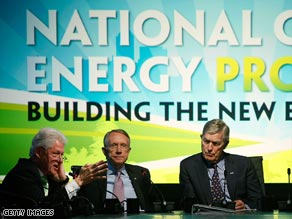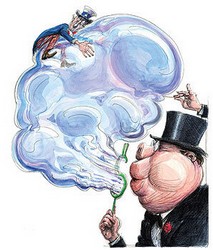I read but try not to blatantly plagiarize Keith Johnson's blog posts... yet he almost always read well between the lines and concisely posts it.
Here he goes again pulling the Climate Standoff, Chinese Wind issue, German Nukes and Cap-and-Trade Disaster all together this week.
Here is quick blurb, but subscribe to his feed to get the good stuff - Short and Sweet!
Cap-and-Trade: "If you liked what Enron, AIG, and the Federal Reserve did to the economy, you'll love cap and trade."
That's the thrust of a new paper from Louisiana State University economist Joseph Mason. Cap-and-trade programs, like the one passed by the House and simmering in the Senate, pose a couple of big problems, he says: They don't work, and they can gum up the rest of the economy. Like many economists, Dr. Mason pines for the elegance of a carbon tax to tackle climate change.
France offers a lesson in how to please no one with its new carbon tax: which upsets both consumers and environmentalists, in the WSJ. Not to mention free-traders, since it includes a carbon tariff, in the FT.
Whatever you do, don't count on carbon offsets to save the day: A new report from Friends of the Earth lambasts offsets as a tool to tackle climate change, at Solve Climate.
Geothermal power can't catch a break: A German geothermal project is put on hold after fresh fears of earthquakes from deep drilling, in the NYT.
Read more of Keith Johnson's blog posts hereThere's lots of sturm und drang over the fate of Germany's nuclear reactors. It's the wrong debate, says The Economist: "To keep the lights burning, Germany may ultimately have to choose between missing its targets to reduce greenhouse gasses or becoming more beholden to Russia for natural gas. That debate could turn radioactive."




 In Europe, slash-and-burn techniques for clearing forested land allowed the farming of crops that had spread from the Fertile Crescent. This practice loosed the forests’ stored carbon into the atmosphere in the form of carbon dioxide. In eastern Asia a couple of millennia later there was a tenfold increase in the growth of rice as the region’s principal foodstuff. That meant the destruction of vast grasslands, which released equally vast amounts of methane—a gas far more efficient at trapping heat than carbon dioxide is.
In Europe, slash-and-burn techniques for clearing forested land allowed the farming of crops that had spread from the Fertile Crescent. This practice loosed the forests’ stored carbon into the atmosphere in the form of carbon dioxide. In eastern Asia a couple of millennia later there was a tenfold increase in the growth of rice as the region’s principal foodstuff. That meant the destruction of vast grasslands, which released equally vast amounts of methane—a gas far more efficient at trapping heat than carbon dioxide is.


 He acknowledged that the developed nations that made the mess can't tell the developing world not to develop, but he also warned that China is on track to emit more carbon in the next three decades than the U.S. has emitted in its history; that business as usual would intensify floods, droughts and heat waves in both countries; that greenhouse gases respect no borders.
He acknowledged that the developed nations that made the mess can't tell the developing world not to develop, but he also warned that China is on track to emit more carbon in the next three decades than the U.S. has emitted in its history; that business as usual would intensify floods, droughts and heat waves in both countries; that greenhouse gases respect no borders. 



 "In a nutshell, theoretical models cannot explain what we observe in the geological record," said oceanographer Gerald Dickens, a co-author of the study and professor of Earth science at Rice University.
"In a nutshell, theoretical models cannot explain what we observe in the geological record," said oceanographer Gerald Dickens, a co-author of the study and professor of Earth science at Rice University. 

